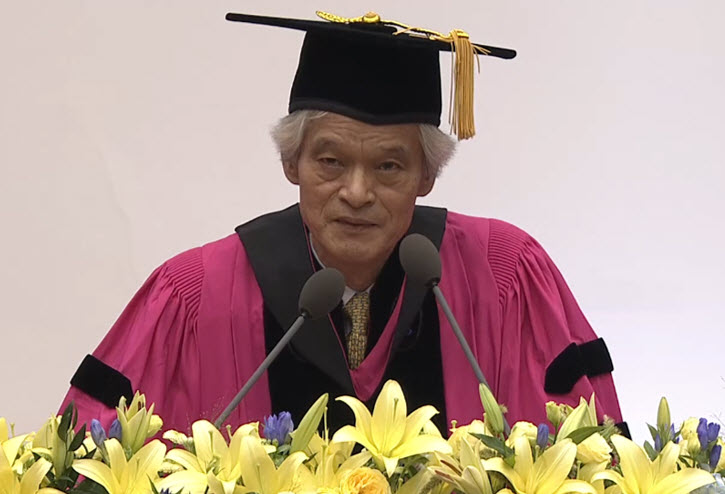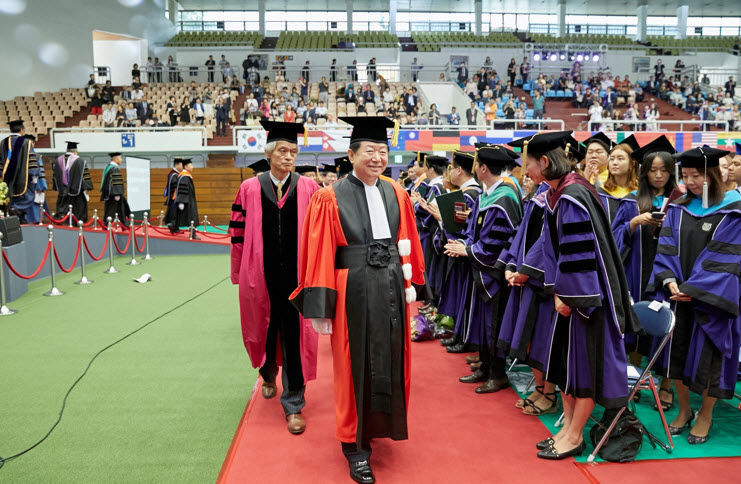
Professor SONG Ho Keun is giving his speech at SNU’s 71st graduation ceremony
SNU’s 71st graduation ceremony was held on August 29. SNU Professor SONG Ho Keun, a sociologist and a renowned columnist, gave the commencement speech. The full text of the speech is as below:
Dear Graduates,
Thank you for giving me this honor to speak here today, as your professor and upperclassman. I would like to say a few words. I joined SNU in 1975 when SNU first opened its doors at Gwanak campus, and have spent 42 years of my life here. I am a happy man. I have lived intensely during my time here, and memories of my youth constantly enliven me. The back-and-forth between pushing myself and nurturing myself all began right here. I want to share with you the most important key to my life: conscientiousness of the heart.
There are times when I walk through the campus, and I find traces from my college days. They are all charming memories. Immature moments, youthful zest, internal suffering, passion, worries about the times - all these are all tangled in my mind. There were times when I stayed behind in the classroom lost in my own thoughts, had disputes with my friends over current events in the department lounge, going to the library, spending time at the Jahayeon pond with my friend who would go on to become a poet, speaking with professors who listened to my complaints and ramblings, and hanging out at pubs with friends at Bongcheondong.
I asked all kinds of questions. Does God exist? How will Korean society emerge from destitution? Are universities powerless in the face of authority? How should one live? I constantly asked myself these questions and could find no answers.
When I look back, my life has been a journey to discover the answers to these questions. The conversations I had with my university friends, my intellectual pursuits, questions about the age we are living in - these efforts constituted the guiding light that would form my logic and ethics of life. This is what will serve as the core of your conscience and accompany you for the rest of your life.

President SUNG Nak-in and Professor SONG Ho Keun are walking down from the stage
The conscientiousness you have developed on this campus through your various wanderings will be your greatest asset on your journey. When you are lonely and in solitude, when you are faced with injustice, when you confronted with an obstacle, or mired in a dilemma, call upon this part of you. This will be what keeps watch over your actions, what regulates, praises, and cheers you on. There are no clear answers, but it will give you direction no matter what ails you. A compass for your thoughts, if you will. With this in possession, you are wealthy.
However, there is a difference between my generation and yours. In my generation, foresight was possible. The general course of society’s development was foreseeable. We were empty-handed, but confident. Whatever came our way we were able to melt in the furnace of our intelligence. All realms of life were predictable: science, technology, systems of production, people’s lifestyles and behavior. Communication and social relations have fundamentally changed. Back then, people wrote on paper. Today, we “write” on computers and smartphones, but the act of writing has not changed. But how will the act of writing change in the future? An AI will perhaps eventually convert brain waves into text. Or maybe it won’t even be writing at all, but just film clips from scenes in our brain. A world in which virtual reality and augmented reality will replace actual reality. Big data, AI, bioX, IoT fused to fashion the most extraordinary reality. It is the age where the micro-revolutions of these various developments will spur the large revolution.
Spengler, Toynbee, and Greek philosophers - will their views on history still be valid? Will Hegel and Marx be refuted? Or Confucius and Mencius, Toegye, Yulgok, and Jeongdasan? Can such macroscopic ideas contain the micro-revolutions that are happening today? 20th century intellectual pursuits sought to uphold universality and exert control over science technology, but now science technology is swerving from the course of the history of civilization. The endeavors of the 21st century will most likely conform to the syntax of micro-revolution. Whereas I lived within the boundaries of imagination, you will lead lives outside of it. It will be a curiosity-evoking, provocative, mysterious, yet also an anxiety-filled world.
But I still have hope: hope that the conscience you developed while on this campus, logic and ethics, reason and sensibility, will accompany you on your journey. This is what constitutes the “self” that you have today, a notebook filled with precious insights you’ve garnered up until now.
You are at the forefront of a mysterious and anxious future. The class before you was, as well. I am not talking about your personal advancement but the advancement of your generation. It is your fate, as it was your fate to be accepted to this university. The more unpredictable the future is, the more you need to reach back to the conscience of your heart that you cultivated here. When you leave this campus, the adventure begins. The road ahead is vague and foggy, but you have the material and substance to create and foster your own truth.
During the Japanese colonization, Lee-Mi-ruek wrote the German novel Der Yalu Fließt. It was 1919, March 1st, and he had to leave Choseon. His mother took him to the edge of their hometown and handed him clothes, oil, a willow box with a pocket watch, and said,
“Yes, you have often been disappointed, but you have steadfastly walked your path. I believe in you. You are going to cross the border, and arrive in Europe. Do not be sad. You have given me and our family so much happiness.”
Now, go on your own!
I believe in you. You have given your professors and your parents so much happiness. And you will give much happiness to the world. We let go of your hand with faith as you go on your own, and create your own path.
I bless you, joining the vanguard of society, and plunging into the sea of intellectual adventure of the 21st century.
Written by Ho Jung Annie Hwang, SNU English Editor, annieohan@snu.ac.kr
Reviewed by Professor Travis Smith, Department of Asian Languages and Civilizations, tlsmith@snu.ac.kr

